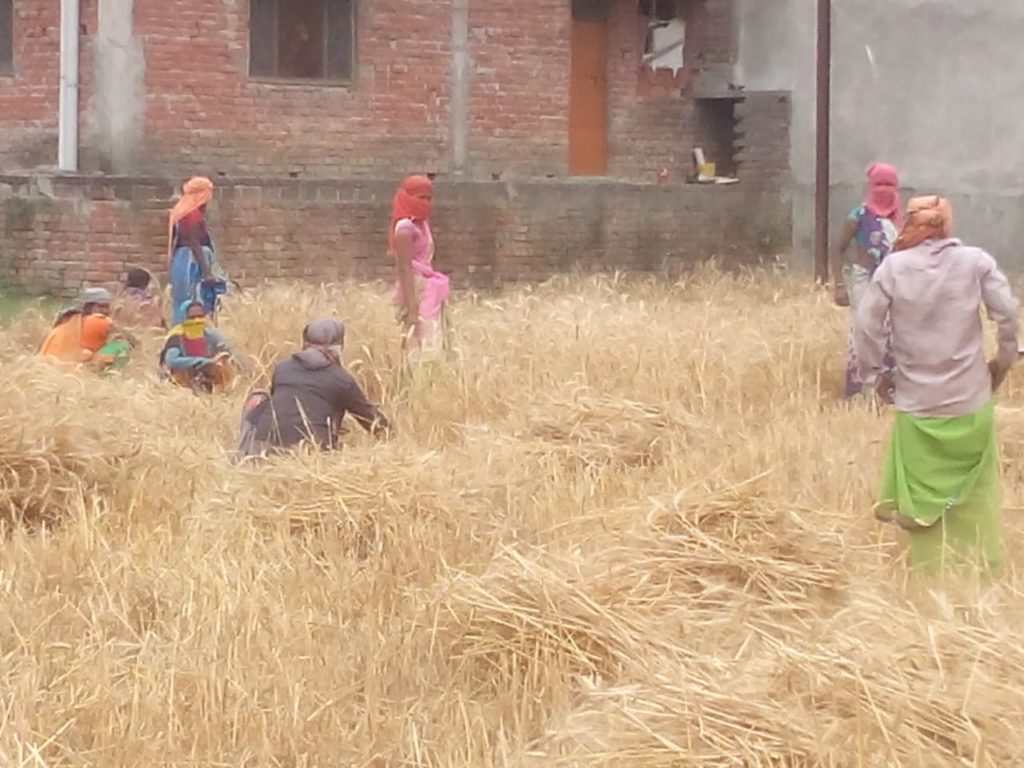New Agriculture Bill; Boiling Controversy
Abstract

Director,
Greater Noida Productivity Council
Frm Director & Head, National Productivity Council, GOI
By introducing the three agriculture bills in the Parliament, it is no doubt present government is concerned about the well being of farmers, saying it will eliminate middleman in the system, is a welcome step, but the way it has been introduced without referring to select committee of Parliament, nor consulting the stake holders like political parties, farmers association, nor clarifying how to implement, the MSP support, the role of monitoring agencies, State Agriculture departments etc the success of the bill raises doubt. Government must immediately review and take appropriate remedies to win the confidence of farmers, who are our “Anna Data”.
On 14th September 2020, Government introduced in Parliament, three bills on Agriculture reform viz 1. Farmer’s Produce Trade and Commerce (Promotion and Facilitation) Bill, 2020, 2. Farmer’s (Empowerment and Protection) Agreement of Price Assurance and Farm Services Bill, 2020 and 3. Essential Commodities (Amendment) Bill 2020, saying a step forward towards fulfilling the dream of doubling farmer’s income, advocating by removing the role of middleman in Agriculture and farm sectors. Out of three above bills introduced two bill Viz Farmer’s Produce Trade and Commerce (Promotion and Facilitation) Bill, 2020, 2. Farmer’s (Empowerment and Protection) Agreement of Price Assurance and Farm Services Bill, 2020 passed from Lok Sabha and Rajya Sabha during 17th 2020 and on 20th September (Sunday) amid scenes of chaos and uproar, the Rajya Sabha also passed two of a set of three controversial bills respectively. The Essential Commodities (Amendment) Bill was already passed a week ago. The said bills will get the accent of the President of India before it is implemented. Some political parties like Shiromani Akali Dal (SAD) & AIADMK (Both part of NDA and SAD leader Harsimrat Kaur Badal quitting the Cabinet on the issue), Congress, Shiv Sena, TRS, RJD, Trinamool Congress, AAP , DMK and CPM including major farmers from Punjab, Andhra Pradesh, Telangana, Karnataka and there organisations, such as the Bharatiya Kisan Union and the umbrella All-India Kisan Sangharsh Coordination Committee, a front for nearly 200 farmers’ groups, have also opposed the bills. The passing of these bills created much more furors than any other bill introduced during Modi regime.
Government version of the bill highlights the following points;
- The Farmers’ Produce Trade and Commerce (Promotion and Facilitation) Ordinance, 2020 allows intra-state and inter-state trade of farmers’ produce beyond the physical premises of Agricultural Produce Market Committee (APMC) markets. State governments are prohibited from levying any market fee, cess or levy outside Agricultural Produce Market Committee (APMC) areas.
- The Farmers Agreement Ordinance creates a framework for contract farming through an agreement between a farmer and a buyer prior to the production or rearing of any farm produce. It provides for a three-level dispute settlement mechanism: the conciliation board, Sub-Divisional Magistrate and Appellate Authority.
- The Essential Commodities (Amendment) Ordinance, 2020 allows the central government to regulate the supply of certain food items only under extraordinary circumstances (such as war and famine). Stock limits may be imposed on agricultural produce only if there is a steep price rise.
The background;
India has the biggest Agriculture marketing network in the World. Agricultural markets are mainly regulated by state Agriculture Produce Marketing Committee (APMC) laws. APMCs were set up with the objective of ensuring fair trade between buyers and sellers for effective price discovery of farmers’ produce. APMCs can: (a) regulate the trade of farmers’ produce by providing licenses to buyers, commission agents, and private markets, (b) levy market fees or any other charges on such trade, and (c) provide necessary infrastructure within their markets to facilitate the trade.
The Standing Committee on Agriculture (2018-19) observed that the APMC laws are not implemented in their true letter and spirit and need to be reformed urgently. Issues identified by the Committee include: (a) most APMCs have a limited number of traders operating, which leads to cartelization and reduces competition, and (b) undue deductions in the form of commission charges and market fees (c) Traders, commission agents, and other functionaries organize themselves into associations, which do not allow easy entry of new persons into market yards, stifling competition. The Acts are highly restrictive in promotion of multiple channels of marketing such as more buyers, private markets, direct sale to businesses and retail consumers, and online transactions and competition in the system.
Those who are opposing the bill put their arguments like;
- The bill is anti farmers, as it did not support Minimum Support Price (MSP)
- Before introducing the bill in Parliament it was not sent to select committee for details analysis.
- The bill will promote corporatization of farms and farmers will be losers. In the contract farming, farmers will be subject to exploitation.
- What will be mechanism to settle disputes arises out of contract farming. Is not well chalked out.
- The bill was not discussed adequately with all before passing in Parliament.
The argument of the Government is as such;
- The contract farming bill provides for a national framework on farming agreements. According to the bill’s preamble, it seeks to protect and empower farmers to engage with agri-business firms, processors, wholesalers, exporters or large retailers for farm services and sale of future farming produce at a mutually agreed remunerative price.
- The new contract farming law’s intent is to make sure investment flows into farms. By clearly defining the legal framework, the new law could inspire confidence of both the farmers and agribusinesses.
- Once contract farming becomes mainstream, agribusinesses will pool farmers together, invest in their land, provide them with know-how and technology without farmers having to fear adverse impact on land titles or corporations fearing sunken investments.
- According to the government’s report on doubling farmers’ income, the Dalwai committee report says on contract farming “will allow smallholders to integrate their production into the supply chains of processing plants” leading to efficient supply chains.
- According to committee report poultry business in India already runs on a successful contract farming model. 66% of poultry production in the country is under contract farming which is a successful model.
- The main operative clauses of the contract farming law are that a farmer may enter into a written agreement to supply produce at a future date at a mutually agreed price. The contract can range from 1 to 5 years. The agreement must include the price or a price band. If any extra amount over the agreed price is to be paid, the prevailing price in APMC markets will be counted.
- Under the new law, a dispute mechanism can be triggered with the local magistrate, who can then call for the dispute to be settled through reconciliation or settle the dispute within 20 days.
- Through Contract farming farmers will be in touch with buyers and the role of middle man will be reduced.
- The problem of finance, quality seeds, etc will be taken care by contractor, therefore quality of lives of farmers will enhance including their purchasing power and standard of life.
- Farmers can sell their produce anywhere in the country and will not be dependent on APMC alone. Choice is with farmers.
To Conclude
Present Government has already committed to double the farmers income by 2022 is a welcome step, but what is the guarantee by introducing the said bill it will revolutionize the whole system.
Government should look in to following consideration;
- There are some states like, Bihar, Kerala, and some UTs who have scrapped APMC, there farmer’s condition have not changed a lot.
- Out of 60 crore farmers, nearly 85 per cent farmers own less than two hectares of land. Farmers like these find it difficult to negotiate directly with large-scale buyers. Government must keep a separate provision of Supply chain network for small farmers; so that they are not subjected to exploitation. At least Mandis play a crucial role in ensuring timely payments to them. Moreover Mandis may be important for north India but is irrelevant in South India. Removing these markets, or allowing corporate direct access, without offering an alternative, such as regulated direct-purchase centers, will do justice is a matter of future. This requires more clarity.
- Not more than 15% of farmers have access to e-markets, nor they have got computer and net facility, so it is going to happen is doubtful. This shows again farmers have to go to middleman for selling their produce.
- Government should ensure in writing to farmers that MSP and Mandi systems will co-exist and it will be the choice of farmers to opt.
- Government should ensure all the facilities like, subsidies fertilizers, good quality seeds, water, and electricity facilities etc to continue.
- Government should clarify the role of central government agriculture departments, States Agriculture departments, and other agriculture research institutes etc including monitoring agencies.
- Government should take in to confidence through dialogue and meetings various stake holders like, all political parties, farmers association etc before implementation of the said act.
- Government must include a clause that every year a minimum support price for all the agriculture produce to be paid by private buyers also so as to avoid arms twisting for lowest rate by them.
- A monitoring agency to look in to the exploitation done by Mandi Samities, if any, should be constituted. Moreover the charges of Mandi Samities should be reduced to 2 to 3.5 % maximum.
- In case if there is a crop failure due to calamities or any other reason than who will compensate the farmer apart from farm insurance which is not adequate in India. Chinese farmers are covers by insurance up to 80-90 of the sum assured. That gives confidence amongst farmers. Even in US compensations are adequate.
- If private buyers start purchasing directly from farmers, state Governments will lose out on taxes that are charged at Mandis. Another fear is that if Mandis may lose attraction and the chances are losing jobs of millions who work there.
- There is no denying the fact by the introduction of these bills, economic conditions of farmers will improve, but the approach to implement the same is not very clear. Government should convince farmers by organizing meetings and conferences.
- For e-commerce facilities should be extended to support small and marginal farmers by providing them registration numbers
- Some food processing industries should be exclusively earmarked to buy from small and marginal farmers.
- Finally Government should try to avoid taking these types of decisions like Agriculture bill, privatization of Mines, Railways, and Airports etc during Covid-19 Pandemic period, which gives a wrong message across societies. Moreover controversy over Agriculture bill it is due to differences in the political ideologies of different political parties and after all it is a matter of ego.
(This is the personal opinion of the writer)





